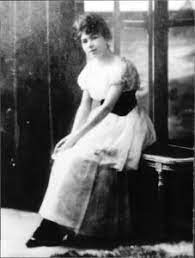Alfonsina Storni
Alfonsina Storni
Alfonsina Storni Was an Argentine poet and writer linked to modernism.
Storni's parents owned a brewery in the city of San Juan and returned to Switzerland, their country of origin, in 1891. In 1896, they returned to Argentina together with Alfonsina, who had been born in that country. In San Juan, he attended kindergarten and developed the first part of his childhood. At the beginning of the 20th century, the family moved to the city of Rosario (Santa Fe province), where his mother founded a home school and his father installed a café near the Rosario Central railway station. Alfonsina worked as a waitress in the family business but since she did not like this job, she became independent and got a job as an actress. Later he would tour several provinces on a theatrical tour.
Storni worked as a teacher in different educational centers and wrote her poetry and some plays during this period. His prose is feminist and, according to critics, has an originality that changed the meaning of Latin American lyrics. In his poetry he leaves eroticism aside and approaches the subject from a more abstract and reflective point of view. Literary criticism, for its part, classifies texts edited between 1916 and 1925 as late-romantic, and from Ocre it finds avant-garde features and resources such as the antisonet (sonnet in white verse). His compositions also reflect the illness he suffered for much of his life and show the waiting for the end of his life, expressing it through pain, fear and other demotivational feelings.
She was diagnosed with breast cancer, on which she was operated. At the request of a Storni journalistic medium, a chirology study was carried out, the diagnosis of which was not correct. This depressed her even more and caused a radical change in her character that led her to discard medical treatments to combat the disease.
She committed suicide in the city of Mar del Plata by throwing herself off the breakwater of the Argentine Women's Club. Alfonsina considered suicide to be a choice granted by free will and had expressed this in a poem dedicated to her friend and lover, the also suicidal writer Horacio Quiroga. There are romantic versions that say that he went slowly into the sea and served as inspiration to compose the song "Alfonsina y el mar", which recounts the event and suggests the reason. His body was initially veiled in Mar del Plata and finally in Buenos Aires. His remains are buried in the Chacarita cemetery.
links:
phrase:





Comentarios
Publicar un comentario